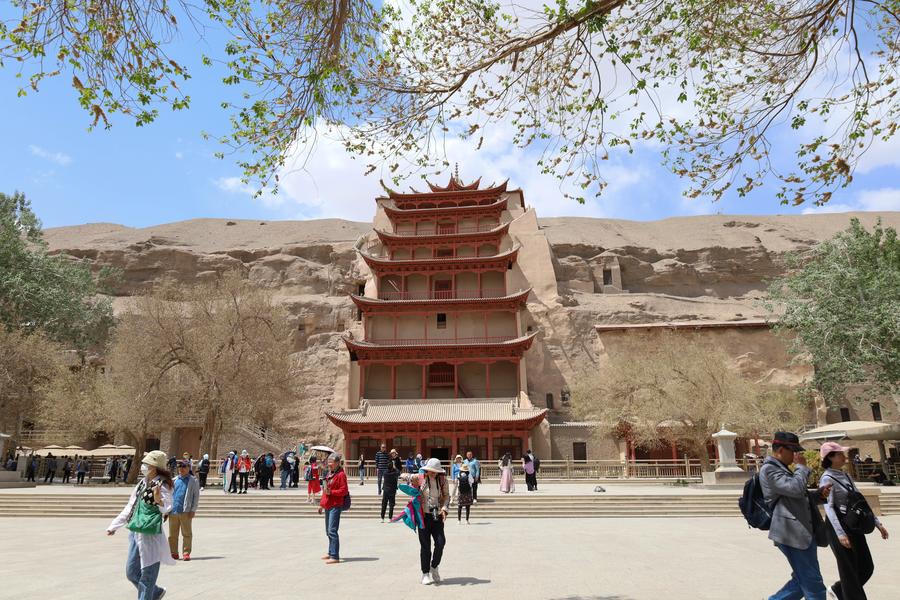by Xinhua writer Zhang Yunlong
BEIJING, May 17 (Xinhua) — As the summer heat begins to set in, temperatures have soared above 30 degrees Celsius in Qufu, the hometown of Confucius in Shandong Province. For Kong Lingmei, a guide at the Nishan Sacredland tourist resort, the arrival of summer signals the beginning of the peak season for educational travel.
Kong guides study groups through the intricacies of the five halls of Nishan Sacredland, named after the Confucian virtues of benevolence, righteousness, propriety, wisdom and trustworthiness. She helps visitors appreciate the wisdom of Confucianism through the architectural and artistic expression visible in the halls, immersing them in the spiritual world of ancient sages.
Educational travel, or study travel, fuses education and tourism to offer students the chance to step out of the traditional classroom and take part in hands-on educational experiences and research-based learning. This mode of travel is gaining popularity among primary and secondary school students and their parents across China.
Experts suggest that the trend not only promotes holistic education but also injects new vitality into tourism consumption, fostering the mutual growth of the two sectors.
RAPID GROWTH
With the post-epidemic revival of domestic cultural tourism consumption, study travel has seen rapid growth.
Data from the Qufu cultural heritage bureau, for example, shows that from Jan. 1 to May 12, 2024, the three Confucian sites — the Temple of Confucius, the Kong Family Mansion and the Cemetery of Confucius — welcomed 3.679 million visitors, a 13.9 percent increase compared to the same period in 2023.
And Nishan Sacredland reported receiving 375,800 study travelers in 2023, surpassing the 217,300 seen in 2019, according to the resort’s operator.
Hu Yongjun, a National Tourism Standardization Technical Committee expert, said that through study travel, students can explore famous landscapes, understand historical changes and appreciate cultural treasures. This not only satisfies their thirst for knowledge but also immerses them in the excellence of traditional culture.
MARKET POTENTIAL
About 2,400 kilometers west of Qufu, the Mogao Grottoes lie serenely in the Gobi Desert oasis of Dunhuang. They were a beacon on the ancient Silk Road and now illuminate a millennium of cultural exchange. The site’s murals and sculptures are renowned for their artistic beauty.

The Dunhuang Academy has utilized the Mogao Grottoes, a UNESCO World Heritage site, to create the Mogao School study travel brand. It has developed more than 10 study experience courses based on the characteristics of Dunhuang’s cave art, as well as its mural restoration and sand control techniques. In 2023, the academy’s study travel products attracted 30,800 participants.
Chai Qilin, deputy head of the cultural promotion department at the Dunhuang Academy and head of the Mogao School, said that the study travel programs aim to educate young people about Dunhuang culture and the fine traditional Chinese culture, and to ensure that these cultures are passed on. The goal is to “convey the fragrance of Dunhuang art through the ages and perpetuate the brilliant glow of history.”
On China’s southeastern coast, the Museum of Foochow Arsenal 1866 in the Mawei district of Fuzhou, Fujian Province, is also a popular study travel destination.
It was there that in the 1860s, the Qing government established the Foochow Arsenal, or “Chuan Zheng” in Chinese, creating a naval system comprising shipyards, schools and the Fujian Fleet. The site became the birthplace of China’s modern shipbuilding industry and the cradle of the modern Chinese navy.
“This represents the significant efforts of the Chinese people in modern times to explore a path to national rejuvenation,” said Chen Yue, head of the Mawei shipyard culture research association. Chen noted that the museum’s study travel programs emphasize the spirit of “patriotism, science, innovation and striving for strength” in their cultural essence, and focus on fostering cultural confidence and the spirit of self-reliance in particular.
In addition to courses on the history of the Foochow Arsenal, the museum is developing secondary courses related to shipbuilding and the history of China’s aviation industry, designing programs on ancient and modern ship culture and aviation.
“In essence, study travel creates a bridge between eager students and rich cultural resources, promising broad market potential,” Hu said. According to figures from the Ministry of Culture and Tourism, China saw a total of 4.89 billion domestic travel trips in 2023, a 93.3 percent surge from the previous year. ■
